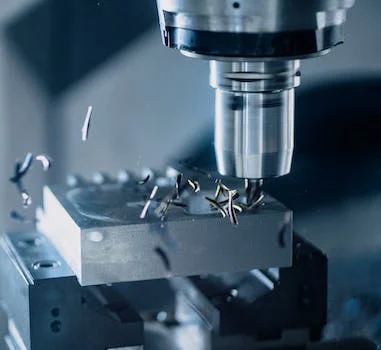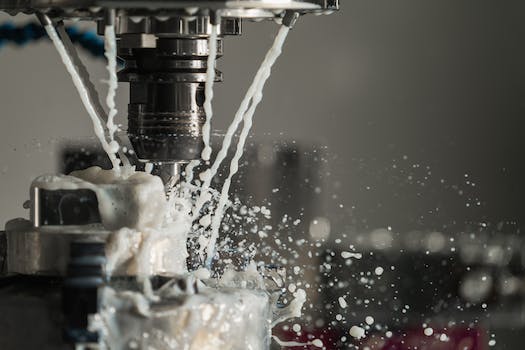Introduction to CNC Machining and its Role in the Manufacturing Industry
CNC machining, or Computer Numerical Control machining, is a manufacturing process where pre-programmed software dictates the movement of factory tools and machinery. This technology can be used to control a range of complex machinery, from grinders and lathes to mills and routers. With CNC machining, three-dimensional cutting tasks can be accomplished in a single set of prompts. Its role in the manufacturing industry is significant as it allows for increased efficiency in production. It reduces the possibility of human error, enhances precision, and allows for the creation of intricate and complex parts with high accuracy. In essence, CNC machining is revolutionizing the manufacturing industry by offering faster, more efficient, and precise production methods.
Understanding the Basics: How Does CNC Machining Work?
CNC machining, short for Computer Numerical Control machining, is a manufacturing process that revolutionizes the industry by automating the control of machining tools. In simple terms, it works by using computers to direct the movement of factory machinery and tools. The process begins with a digital 3D design of the product, which is then converted into a series of numerical codes. These codes are fed into the CNC machine, guiding it to cut and shape the material exactly as per the design. This results in precise, efficient production with minimal human intervention, making CNC machining a game-changer in the manufacturing industry.
The Evolution of Manufacturing: From Traditional Methods to CNC Machining
The manufacturing industry has undergone significant transformations over the years. Traditional manufacturing methods, like manual machining, were labor-intensive and time-consuming. They required skilled workers to meticulously cut, drill, and shape raw materials into final products. However, with the advent of Computer Numerical Control (CNC) machining, the landscape of manufacturing has changed dramatically. CNC machines, guided by computer-aided design (CAD) files, automate the fabrication process with high precision and speed. This technology not only increases production efficiency but also reduces human error, leading to better quality products. The evolution from traditional methods to CNC machining is truly revolutionizing the manufacturing industry.
Precision and Accuracy: The Main Advantages of CNC Machining
CNC machining is revolutionizing the manufacturing industry primarily because of its precision and accuracy. Unlike manual machining, CNC machining makes it possible to produce parts with exact dimensions, allowing for very little error. The machine follows a programmed path to ensure each cut is the same, regardless of the volume of parts being produced. This results in consistent, high-quality parts with minimal waste. In addition, CNC machines can also operate round the clock, further boosting productivity. Thus, the precision, accuracy, and efficiency of CNC machining make it a game-changer in the manufacturing industry.

How CNC Machining is Enhancing Productivity in the Manufacturing Industry
CNC machining is significantly boosting productivity in the manufacturing industry. This advanced technology allows manufacturers to automate their production processes, reducing human error and increasing precision. As a result, products are made faster, more efficiently, and with greater accuracy than ever before. Not only does this lead to improved product quality, but it also cuts down on waste, saving both time and resources. Furthermore, CNC machines can operate around the clock, unlike human workers, leading to a dramatic increase in output. In essence, CNC machining is revolutionizing the manufacturing industry by making it more efficient, precise, and cost-effective.
The Role of CNC Machining in Reducing Waste and Increasing Efficiency
CNC machining plays a pivotal role in reducing waste and increasing efficiency in the manufacturing industry. This automated process minimizes errors that are often associated with manual machining, leading to a significant decrease in material waste. It also enables precise and consistent production of complex parts, which directly improves efficiency. By creating parts right the first time, manufacturers save time, resources, and energy, making CNC machining a sustainable choice for the industry. This technology’s ability to deliver high accuracy and speed is truly revolutionizing the manufacturing sector.
CNC Machining and the Emergence of Complex Design Capabilities
CNC machining is a game-changer for the manufacturing industry, enabling complex design capabilities like never before. This technique uses pre-programmed computer software to guide machinery, creating precision parts with exact measurements. The beauty of CNC machining is that it can accurately replicate intricate designs, which was previously a difficult task. This has opened new avenues for innovation in product development, making it possible to produce complex and delicate designs with ease and speed. With CNC machining, manufacturers can now easily meet the growing demands for customized, high-quality products. This revolutionary technology is certainly setting new standards in the manufacturing industry.

Case Studies: Real World Applications of CNC Machining in Manufacturing
In the world of manufacturing, CNC machining continues to revolutionize the industry with its efficiency and precision. One real-world application of this technology can be seen in the automotive industry where CNC machines are used to create engine components. These machines offer unmatched accuracy, ensuring each part is made to exact specifications, reducing waste, and increasing production speed. Similarly, in the aerospace industry, CNC machining is employed to manufacture complex parts that meet rigorous safety and quality standards. These case studies highlight how CNC machining is transforming the manufacturing industry, offering increased efficiency, precision, and cost-effectiveness.
The Future of Manufacturing: Predictions for CNC Machining
CNC machining is poised to dramatically reshape the future of manufacturing. Predictions suggest a rise in automation, with machines doing most of the work, resulting in increased productivity and precision. This technology will enable manufacturers to reduce waste and save time, as the machines can work 24/7 without errors or breaks. The integration of AI and IoT in CNC machining is also expected, enabling predictive maintenance and real-time monitoring of operations. In essence, the future of manufacturing is leaning towards smart factories where CNC machines play a pivotal role.
Conclusion: The Continuous Revolution of the Manufacturing Industry by CNC Machining.
In conclusion, CNC machining is continuously revolutionizing the manufacturing industry by enhancing efficiency, precision, and cost-effectiveness. This technology allows for complex designs to be produced with a high level of accuracy, reducing the margin of error significantly. As a result, wastage is minimized, and the overall production time is reduced, leading to increased productivity. The flexibility of CNC machines also enables manufacturers to meet customer demands quickly and effectively. Thus, the continuous revolution of the manufacturing industry by CNC machining is a testament to the transformative power of technology, paving the way for a more efficient and innovative future.

0 Comments